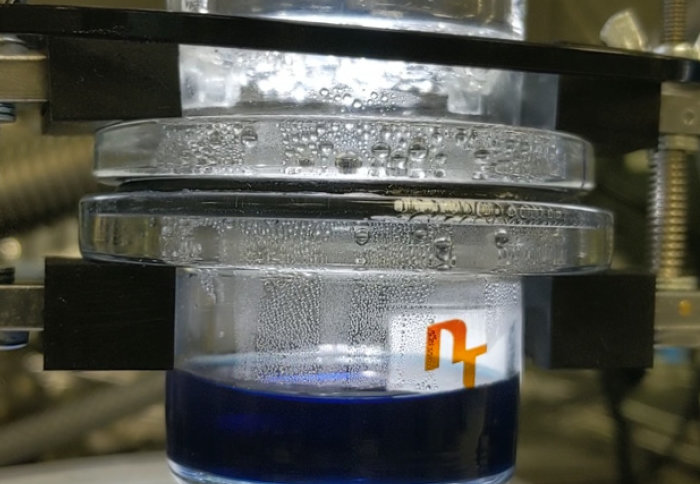Hydrogen production boost and the best of frenemies: News from the College

Here’s a batch of fresh news and announcements from across Imperial.
From a new material to improve hydrogen production, to enhancing tech innovation through collaboration, here is some quick-read news from across the College.
Improving hydrogen production
Researchers from Imperial, King Abdullah University of Science and Technology (KAUST) and the National Institute of Standards and Technology (NIST) have created a new material that could produce higher yields of hydrogen gas than current technologies. The material is a photocatalyst, meaning it uses light to split hydrogen from water.
The new photocatalyst absorbs a much larger portion of the solar light spectrum and can therefore harvest more light, which translates into higher yields of hydrogen. The team blended two materials using nanoparticles to combine their advantages and create a structure that could harvest a wider range of light.
Read the full paper in Nature Materials: ‘Enhanced photocatalytic hydrogen evolution from organic semiconductor heterojunction nanoparticles’
EPSRC appointment
 Imperial’s Professor Paul French has been recruited to the Science, Engineering and Technology Board of the Engineering and Physical Sciences Research Council (EPSRC).
Imperial’s Professor Paul French has been recruited to the Science, Engineering and Technology Board of the Engineering and Physical Sciences Research Council (EPSRC).
Professor French leads multidisciplinary research into new optical imaging techniques for biomedical applications in the Department of Physics and is Vice Dean (Research) for the Faculty of Natural Sciences.
The role of the Board is to use scientific and technological insight to identify and champion bold new research challenges at the cutting edge of engineering and physical sciences for future investment. Among their responsibilities, members will make the case for fundamental discovery research, helping to identify and publicise scientific breakthroughs in the engineering and physical sciences domain.
Read more on the EPSRC’s website
Online course innovation
Imperial continues its collaboration with the world leaders, edX and Coursera, by launching free online courses on Coaching and Deep Learning.
'Coaching Skills for Learner-Centred Conversations' was developed by Dr Arti Maini, Coaching Lead for the Medical Education Innovation and Research Centre (MEdIC). Teachers enrolling on this course will learn to apply key coaching principles to educational conversations to support learners.
‘Getting Started with TensorFlow 2’ will be led by Dr Kevin Webster, Senior Teaching Fellow in Statistics. This course will be the first of a set of three focused on Deep Learning. Learners will develop a complete end-to-end workflow for a deep learning model in one of the most widely used frameworks for deep learning.
Emissions gap
 A decade of insufficient political action on climate change means that nations must now do four times the work – or do the same in one-third of the time – to comply with the Paris Agreement, says scientists in a Nature comment piece.
A decade of insufficient political action on climate change means that nations must now do four times the work – or do the same in one-third of the time – to comply with the Paris Agreement, says scientists in a Nature comment piece.
“Public awareness of climate change has taken great leaps over the past decade. Climate policy and action, however, have slacked. We are now looking back at a lost decade for reducing emissions, leaving us in a much tougher place”, said co-author Dr Joeri Rogelj.
The authors’ conclusions are based on all ten editions of the Emissions Gap Report, a report that examines the difference (the ‘gap’) between what countries say they will do, and what they need to do, to prevent dangerous levels of climate change.
Read more on Nature: ‘Emissions: world has four times the work or one-third of the time’
PhD funding
 UKRI announced today (6 March 2020) their next round of funding through the Engineering and Physical Sciences Research Council (EPSRC) for Doctoral Training Partnerships, which support postgraduates to conduct research across the physical sciences, maths and engineering.
UKRI announced today (6 March 2020) their next round of funding through the Engineering and Physical Sciences Research Council (EPSRC) for Doctoral Training Partnerships, which support postgraduates to conduct research across the physical sciences, maths and engineering.
Imperial will receive more than £11m of funding, which will support around 110 PhD students, including via the President’s PhD Scholarship scheme. The funding will also be used to support vacation internships and a one-year post-doctoral fellowship scheme for EPSRC-funded students who have recently finished their PhDs and have an exciting outcome to explore further.
Best of frenemies
 Successful collaboration is often an important part of technological innovation – think of Steves Jobs and Wozniak. Managerial experts understand real-world practicalities, while technology “geeks” actually understand the product they’re selling.
Successful collaboration is often an important part of technological innovation – think of Steves Jobs and Wozniak. Managerial experts understand real-world practicalities, while technology “geeks” actually understand the product they’re selling.
But just putting a marketer and a technologist together isn’t enough: not only do their skills need to complement each other, so too do their wider networks. In a new article for IB Knowledge, Drs Anne ter Wal and Paola Criscuolo explain why 'dual networking' is the secret to innovative collaborations.
Read the full article on IB Knowledge: ‘Innovation happens when technologists and managers make the best of frenemies’
–
Want to be kept up to date on news at Imperial?
Sign up for our free quick-read daily e-newsletter, Imperial Today.

Article text (excluding photos or graphics) © Imperial College London.
Photos and graphics subject to third party copyright used with permission or © Imperial College London.
Reporter
Hayley Dunning
Communications Division
Michael Mills
Business School
Murray MacKay
Communications Division
Lottie Butler
The Grantham Institute for Climate Change
Madeleine Stone
Business School